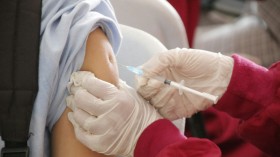The infamous invaders of kitchens, motel, and more, cockroaches have long been associated with filth and disgust. However, new research is associating them with personality as well, as they provide a strong example of individuality among insect populations.
Personality is generally associated with mammals, where pet owners will be quick to point out differences in behavior and disposition among their dogs and cats. Experts have even begun to record how highly intelligent mammals, like whales, dolphins, great apes, and even monkeys have some sense of "self" and what makes them unique. Some have argued that even fish and lizards behave in ways that hint at bold or shy personalities.
However, in the case of invertebrates, which appear highly alien to us, it's much harder for experts to find evidence of distinctive behavior. Past studies have named spiders and other bugs as likely candidates for personality, but as they often live in small communities, researchers suspect that group behavior and influence can often hide what would otherwise be strong evidence of distinct traits.
Enter the American cockroach; this infamous pest, while a common invertebrate, can often be observed living a life of solitude with very few communal behaviors to speak of.
This, Isaac Planas-Sitjà, a behavioral ecologist at the Free University of Brussels, recently explained to the AAAS, is what makes them ideal subjects for personality studies. (Scroll to read on...)
As described in a study recently published in the journal Proceedings of the Royal Society B, the ecologist and his colleagues glued tiny radio chips to the thoraxes of 304 roaches, allowing them to track the behavior of these insects after they were placed in a new environment.
Three times a week, the team placed groups of 16 roaches in a brightly lit circular area. This region was complete with two circular shelters that could keep the sensitive pests out of light.
They quickly found that over and over again, the same roaches spent more time exploring, even as their more cautious comrades made a mad dash for cover. This was despite the fact that each roach was equally sensitive to the light. In this way, the researchers quickly found that there are both shy and bold roaches.
However, by the end of each three hours session, all 16 roaches always wound up grouped together under one of the two shelters. Planas-Sitjà explained that this implies that despite differences in individual personality, the pressure of group action can easily overpower individuality, just like in humans.
"To be able to show group personality as they have done is very exciting and intriguing," Odile Petit, an ethologist at the French national research agency CNRS, who had been following the work, commented in Science Magazine. "They've shown that individuals and their personalities matter even in simple animals."
So the next time you go to crush a roach under your boot, remember that it isn't just gooey guts in a filthy shell. It's full of personality as well!
Who knew that personality could make such a satisfying crunch?
For more great nature science stories and general news, please visit our sister site, Headlines and Global News (HNGN).
© 2024 NatureWorldNews.com All rights reserved. Do not reproduce without permission.




